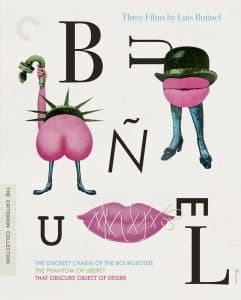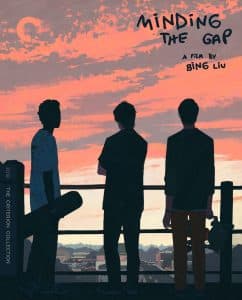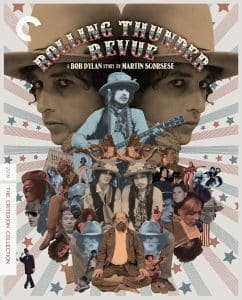Read also:
How to Watch FX Live Without CableHow To Watch AMC Without CableHow to Watch ABC Without CableHow to Watch Paramount Network Without CableWelcome to the Criterion Corner, where we break down some of the month’s new releases from the Criterion Collection.
Three Films by Luis Buñuel

#102: The Discreet Charm of the Bourgeioisie (1972)
#143: That Obscure Object of Desire (1977)
#290: The Phantom of Liberty (1974)
Some directors lose their touch in their later years, but others go out with a bang, throwing up all pretense of compromise and closing their careers with some of their greatest, most individualistic works. The latter’s certainly true of Spanish-born surrealist Luis Buñuel, he of the sliced-open eyeball in Un Chien Andalou, whose three final films — The Discreet Charm of the Bourgeoisie, The Phantom of Liberty, and That Obscure Object of Desire — were made in the mid to late ’70s, shortly before his death and comprise some of his most famous accomplishments. Even as someone who is shamefully less familiar with Buñuel’s oeuvre (though Belle de jour remains a perennial favorite), Criterion’s recently-assembled box set of these three masterworks is an elegant primer on the man’s inaccessible, but irrepressible treatises on the innate silliness of keeping up appearances, and the stunted desires of the privileged.
Of the three films collected here (all long-awaited Blu-ray upgrades of films that have been in the Collection for a good long while), The Discreet Charm of the Bourgeoisie is arguably his most accessible, a witty flight of fancy tracking a group of well-off friends, lovers, and associates as they consistently try to sit down for dinner. They’re interrupted by myriad disasters, from military maneuvers to a fourth-wall-breaking reveal that they’re on a stage in a play, none of these interludes disrupting the dream reality that has been set up for them. As the film progresses, they grow progressively hungrier and more frustrated, regardless of the circumstances that surround them. Characters shift and turn on a dime, moving from friend to enemy, lover to stranger, gardener to priest — don’t expect to know what’s going on, but Buñuel’s aim is instead to illustrate the complacency of the upper classes in the face of the violence and torment in the world around them. Even as the military moves on them, all they care about is their next meal.
From there, things get even more inscrutable in That Obscure Object of Desire, Buñuel’s final film, about a wealthy widower named Mathieu (Fernando Ray, a fixture in Buñuel’s stable of actors) carrying on a tempestuous romance with a flamenco dancer named Conchita, played alternatively and with relish by future Bond girl Carole Bouquet and the fiery Ángela Molina. Each woman represents a different side of Conchita, or rather, which side of her Mathieu sees at that moment: the Conchita he can possess, and the Conchita who threatens to upend his implicit dominance over her. The two challenge each other amid the backdrop of the sexual liberation of the ’70s, Buñuel treating us to one skirmish after another in the battle of the sexes (not to mention generations, as Mathieu is much older and consequently follows the still-beating machismo of his peers). It’s scandalous but smart, and deviously acid-tongued in its takedown of pompous rich men like Mathieu, who think young ingenues like Conchita can be controlled. Both characters get a bucket of water to the face by the end of it, a potent metaphor for Buñuel’s impish piss-take on the erotic drama.
But the set closes out with Buñuel’s most aimless film yet, The Phantom of Liberty, which succeeds mightily despite its position as the furthest thing from comprehensible in this set. Less a story and more a series of absurd, Pythonesque interludes about the ridiculous veneer we assign to polite society, Phantom of Liberty feels like Buñuel spilling out his every thought about the petty concerns of everyday life and its attendant misunderstandings on the screen. The world of the film doesn’t make sense, flitting from one scenario to the other with all the murkiness of a dream. And yet, that’s the point: we see Carmelite monks playing cards and smoking, police academy classes playing out like rowdy kindergartens, an emu sauntering across an ornate bedroom. It’s here we see Buñuel at his most uninhibited, having a ball while poking a finger at expectation (or even narrative tidiness). Every few minutes brings a new, delightful surprise, Phantom of Liberty proving to be one of cinema’s most delightful exercises in Surrealist anarchy.
It’s fitting these three films would be bundled together in such a thematically coherent package, given their thematic and stylistic harmoniousness, and Criterion has done yeoman’s work upgrading these three films for high-definition and packing the set with extras both old and new. All three films have handsome, if endearingly gritty, transfers, while all three disks serve up welcome scholarship about the individual films and Buñuel’s career as a whole. Some highlights from the extras include a feature-length doc about the filmmaker and his works on disk one (“Speaking of Buñuel”), a handsome video essay on Phantom of Liberty by film scholar Peter William Evans, and an introduction to Obscure Object from screenwriter Jean-Claude Carrière left over from the 2001 DVD release.
You can buy Three Films by Luis Buñuel on Criterion here.
#1061: Minding the Gap (2018), dir. Bing Liu

From absurdist works of the 1970s, we move on to a couple of recent documentaries that prove themselves some of the most exciting and formally or narratively daring of the last few years. The first of which is Minding the Gap, newcomer Bing Liu‘s riveting portrait of himself and two close friends (Kiere Johnson and Zack Mulligan) growing up in working-class Rockford, Illinois. Their lives are marred by poverty, strife, parental and domestic abuse, and (in Bing and Kiere’s case) racism; the one respite they seem to get is their shared love of skateboarding, Liu capturing with a captivating mixture of excitement and liberation. “This device cures heartache,” Kiere draws onto his board, and you feel the escape and joy they do when they get to roll away from their myriad problems.
But Bing knows that those problems eventually catch right back up with you, and the doc is most riveting when it slows its roll to catch up with the frustrations and pain of its subjects. Kiere’s a likable, shy kid who deflects his own pain with an infectious smile and an aw-shucks demeanor, ways of minimizing himself in the face of parental abuse. Zack, meanwhile, is a life-of-the-party type whose surface-level chill is elegantly disrupted by Bing’s interrogation of his girlfriend’s claims of spousal abuse. And Bing himself uses the project to reflect with his mother on their own abuse at the hands of Bing’s stepfather, which fractured their own relationship in the process.
Pain is suffused in every frame of Minding the Gap, but Liu the director looks at that pain not with righteous fury but with delicate empathy, peeling away the layers of abuse and economic dislocation to reveal the raw, universal core of feeling we all have when we struggle against our respective traumas. I’ve loved this film since I saw it in 2018, and I can’t think of a better debut feature in the last decade, much less a more deserving inclusion into the Criterion canon.
Luckily, Criterion knows that too, and on top of the film’s predictably sterling presentation (it was made in the last ten years, after all), it’s got a host of extras that continue the film’s feeling of being a chronicle of these three kids’ friendship. The set boasts two audio commentaries, one from Liu himself and another that reunites Liu with Zack and Kiere (which is as insightful as it is infectiously fun to listen to). We’re also greeted to four outtake scenes with introductions by Liu, a follow-up conversation between Liu and Zack’s former girlfriend Nina Bowgren (featured in the doc), interviews from Liu, Tony Hawk, Kartemquin’s Gordon Quinn, and Diane Quon, and an early short from Liu called Nước that explores similar thematic territory about growing up as a Vietnamese-American.
You can buy Minding the Gap on Criterion here.
#1062: Rolling Thunder Revue: A Bob Dylan Story by Martin Scorsese (2020), dir. Martin Scorsese

From an exciting debut to an old master playing the hits, Criterion continues its stalwart effort to make sure that Netflix’s most interesting original films have some kind of physical presence with Scorsese’s latest, Rolling Thunder Revue: A Bob Dylan Story by Martin Scorsese. A captivating, cheeky mix of documentary concert film and dry narrative trickery, Rolling Thunder Revue sees ol’ Marty cobbling together a new film from the outtakes from Bob Dylan‘s 1978 film Renaldo and Clara, which he shot at the same time he set up a 57-date concert tour across the country, playing small venues with fellow counterculture scions Allan Ginsberg, Patti Smith, Joan Baez and more.
Sure, the Rolling Thunder Revue was a real thing, and Scorsese smartly peppers the film with vivid, incredible concert footage of Dylan playing new and old hits alike, face caked in the white kabuki makeup he insisted on for the tour. But as the clip from the George Méliès film The Vanishing Lady at the top implies, what we’re seeing is a kind of magic trick, an extrapolated version of events stuffed with as much tomfoolery and illusion as real sociopolitical punch about the state of America in the ’70s. Old footage is interspersed with new interviews including everyone from current-day Dylan (who is cagey to this day about what the Rolling Thunder Revue was about) to a fictionalized filmmaker who shot the ’70s footage, to Sharon Stone (who claims to have inspired the tour itself and even went along for the ride). For many, the veil might not be lifted until Michael Murphy shows up as his politician character from Robert Altman’s political satire Tanner ’88, framing the revue within the broader context of an America still reeling from Watergate but gearing up for a bicentennial celebration of a country they no longer knew.
Whether you’re in it for Dylan’s engrossing live performances or the narrative magic trick Scorsese treats us to for the ensuing two and a half hours, Criterion put together a nice package to encapsulate it. The image looks suitably vivid, painstaking restoration of 40-year-old footage still giving you the immediacy of feeling like you’re right in the middle of an old concert or a fly on the wall of an afterparty. The 5.1 soundtrack treats Dylan’s performances quite well, soaking you in his reedy voice and the endearing scratch of the band’s instruments.
The extras are nothing to sneeze at either, from a new interview with Scorsese about the ways Dylan’s tour reflected on America’s fragmented sense of identity at the time to a more irreverent chat with writer Larry “Ratso” Sloman, who followed the tour for Rolling Stone at the time. There’s also a robust booklet that features more than the standard essay (by novelist Dana Spiotta): we get to see notes and poems from Sam Shepard, Allan Ginsberg, and Anne Waldman, all written during the tour itself. It’s a comprehensive portrait of the tour (as much as a semi-fictionalized account of it can be), and proof that Criterion knows it has to give you more bang for your buck if you’re going to buy a movie you could just flip on via Netflix.
You can buy Rolling Thunder Revue: A Bob Dylan Story by Martin Scorsese on Criterion here.